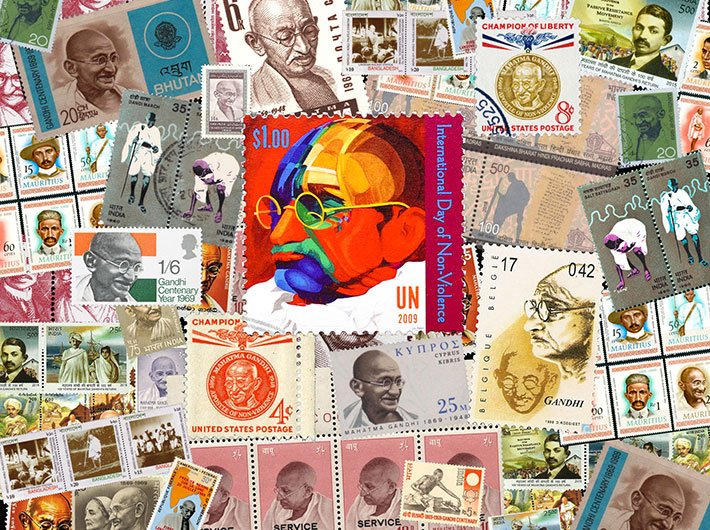As the nation and the world prepare to celebrate the 150th anniversary of Mahatma Gandhi, we bring together a selection from his writings that remain as relevant as ever
Root meaning of politics
"Let it be borne in mind that I do not regard politics as something different in kind from other national activities. The root meaning of politics is the science of citizenship and it has also remote connection with polished manners and since the boundaries of citizenship have been extended to cover continents, the science of politics includes attainment of advancement of humanity along all lines, social, moral, economic and political, using the word ‘political’ here in the narrow sense in which we are accustomed to use it. Ever since my return to India in 1915, it has been my earnest endeavour to restore the meaning of politics to its root and if we would be truthful through and through, we should recognize that the predominant part of the Congress programme has been progressively social, moral and economic. And it becomes a powerful programme because it is intimately connected with the political, that is, the attainment of freedom of the country from foreign yoke, not from foreign friendship, that is, voluntary intercourse on terms of absolute equality with foreign nations. If Congressmen forget the constructive programme and simply confine Congress activities to winning of Assembly and Council elections and of fruitless debates in the Assembly and the Councils, they will soon find that I have taken with me the kernel of politics and they have kept for themselves only the outermost husk, without even the vitamins. But I have no such fear. Parliamentary Congressmen will advance the Congress programmes and by their votes register the will of the nation."
Statement to the press, October 30, 1934 [CWMG 59: 264]
Paramount place to morality in politics
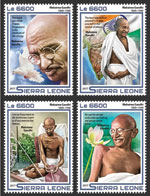
"Ours is a movement of self-purification. There are some who think that morality has nothing to do with politics. We do not concern ourselves with the character of our leaders. The democracies of Europe and America steer clear of any notion of morality having anything to do with politics. Bad characters are often great intellects, and they can manage certain affairs well enough by the force of their intellect. The private character of some of the leading men of the House of Commons will not bear examination.
We too have often carried on our political movement in the same fashion, we did not concern ourselves with the morals of the Congress delegates or leaders. But in 1920 we struck an entirely new departure and we declared that since truth and non-violence were the sole means to be employed by the Congress to reach its goal, self-purification was necessary even in political life.
Today there is not much open opposition to the idea, though there are many who secretly believe that politics should have nothing to do with morality. That is why our progress is so slow and in some respect even nil. If we had acted up to our creed of 1920, we should not have taken nine years to arrive even at the present stage. If swaraj was not meant to civilize us, and to purify and stabilize our civilization, it would be nothing worth.
The very essence of our civilization is that we give a paramount place to morality in all our affairs, public or private. And as one of the functions of the [Gujarat] Vidyapith is to civilize us, the battle of swaraj calls for the greatest sacrifice from the national educational institutions.
I want you all to realize the implications of our creed. If you think that truth and non-violence constitute not the creed but the policy of the Congress, I do not know where I should be. But if you are convinced that they are your personal creed, I need not expatiate on them. … The first thing therefore that this national educational conference and those who are attending it should do is to ask themselves whether all their doings have been in consonance with that creed. If you have gone about your work, following truth and non-violence as a policy, there will come a day when you might be tempted to alter the policy. For instance my friends the Ali Brothers accepted truth and non-violence as a policy, and they never made a secret of it. They always said that they could not accept them as a creed. There are many others of their way of thinking, and they undoubtedly have their place in the service of the country, but for you, students and teachers of national educational institutions, that attitude will not suffice.
You must accept both the principles as your creed and they should be part and parcel of your being. If all make of ahimsa a policy, and I remain the only votary of it as a creed, we can make very little progress. Let us therefore ask ourselves once again, and make sure, that we will in no circumstances harbour untruth and violence for the attainment of swaraj. Then everything will be well. …
Lastly, may I sum up in a word what is expected of you? Even as we have to be pure, let us shed the fear of death. An Englishman has recently told us that though Gandhi may think that India will be none the worse if Englishmen left India, he has no doubt that not a rich man’s property will be safe and not a virgin will be inviolate the moment his countrymen leave India. That shows what a low opinion he has of us Indians. But how can it be otherwise? We are so fear-stricken today that we have to maintain the services of hired men for the defence of our property and our honour. The moment we shed the fear of death, we shall escape from this wretched plight."
Young India, 23-1-1930 and Navajivan, 19-1-1930, [CWMG 42: 395]
Negation of democracy
"In all these doings as I read them, I see no spirit of democracy. Indeed, my recent visit to England has confirmed my opinion that your democracy is a superficial circumscribed thing. In the weightiest matters decisions are taken by individuals or groups, without any reference to the Parliament, and these have been ratified by the Members having but a vague notion of what they were doing. Such was the case with Egypt, the War of 1914, and such is the case with India. My whole being rebels against the idea that in a system called democratic, one man should have the unfettered power of affecting the destiny of the ancient people numbering over three hundred millions, and that his decisions can be enforced by mobilizing the most terrible forces of destruction. To me this is a negation of democracy."
Letter to Sir Samuel Hoare, March 11, 1932 [CWMG 49: 192]
‘The first lesson to be learnt in a democratic, independent India’
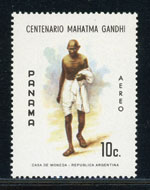
"Gandhiji, therefore, commenced his speech by congratulating Shaheed Saheb and the other Muslims on standing. He purposely kept seated because he had learnt that their culture did not require standing as a mark of respect when any national song or bhajan was sung. It was an unnecessary importation from the West. A respectful posture on such occasions was the correct attitude. After all, it was the mental attitude that mattered, not the superficial appearance. He then suggested that there should be one universal notation for Vande Mataram, if it was to stir millions; it must be sung by millions in one tune and one mode. After all, national songs could only be two or three. But they should all have their common notation. It was up to the Santiniketan authorities or some such authoritative society to produce an acceptable notation. …
Then he answered the question whether the minorities would have recognition as religious minorities had; thus, whether Bengalis of Bihar, though a minority, would have recognition. This was a ticklish question. In his opinion an Indian was a citizen of India enjoying equal rights in every part of India. Therefore, a Bengali had every right in Bihar as a Bihari. But he wished to emphasize that a Bengali must merge in the Bihari. He must never be guilty of exploiting Biharis or feeling a stranger or behaving as a stranger in Bihar. If the speaker brought his Gujarat manners to Bengal and imposed himself on the province, he would expect the Bengalis to expel him. He could not then claim the rights of an Indian as against Bengalis.
All rights flowed from duties previously and duly performed. One thing he must stress, that in both the Dominions of India, the use of force for the assertion of rights must be eschewed altogether if they were to make any progress. Thus, neither the Bengalis nor the Biharis could assert themselves at the point of the sword, nor could the Boundary Commission Award similarly be changed. It was the first lesson to be learnt in a democratic, independent India. Their independence was yet only a fortnight old. Liberty never meant the licence to do anything at will. Independence meant the voluntary restraint and discipline, voluntary acceptance of the rule of law in the making of which the whole of India had its hand through its elected representatives. The only force at the disposal of democracy was that of public opinion. Satyagraha, civil disobedience and fasts had nothing in common with the use of force, veiled or open. But even these had restricted use in democracy. They could not even think of them whilst the Governments were settling down and the communal distemper was still stalking from one province to another."
Speech at prayer meeting, Calcutta, August 29, 1947, reported in Harijan, 7-9-1947 [CWMG 89: 112-13]
‘Mahatma Gandhi ki Jai’
"During the Madras tour, at Bezwada I had occasion to remark upon the national cries [slogans] and I suggested that it would be better to have cries about ideals than men. I asked the audience to replace “Mahatma Gandhi ki Jai” and “Mahomed Ali-Shaukat Ali ki Jai” by “Hindu-Mussulman ki Jai”. …
There should be therefore only three cries recognized, “Allah-o-Akbar” to be joyously sung out by Hindus and Muslims showing that God alone was great and no other.
The second should be “Vandemataram” (Hail Motherland) or “Bharat Mata ki Jai” (Victory to Mother Hind). The third should be “Hindu-Mussulman ki Jai” without which there was no victory for India, and no true demonstration to the greatness of God. I do wish that the newspapers and public men would take up the Maulana’s suggestion and lead the people only to use the three cries. They are full of meaning. The first is a prayer and a confession of our littleness and therefore a sign of humility. It is a cry in which all Hindus and Muslims should join in reverence and prayerfulness.
Hindus may not fight shy of Arabic words when their meaning is not only totally inoffensive but even ennobling. God is no respecter of any particular tongue. “Vandemataram”, apart from its wonderful associations, expresses the one national wish – the rise of India to her full height. And I should prefer “Vandemataram” to “Bharat Mata ki Jai” as it would be a graceful recognition of the intellectual and emotional superiority of Bengal. Since India can be nothing without the union of the Hindu and the Muslim heart, “Hindu-Mussulman ki jai” is a cry which we may never forget."
‘Three national cries’, Young India, 8-9-1920 [CWMG 18: 244]
“Has what I am doing today penetrated your hearts?”
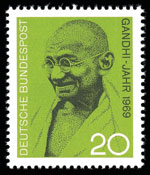
'The objective of the constructive works organizations is to generate political power. But if we say that political power having come, it must be ours as a price for our labours, it would degrade us and spell our ruin. Take the case of the Charkha Sangh. It has the largest membership of all the Sanghs [Congress wings]. But we have never endeavoured to get its members enrolled on the voters’ list. It was suggested at one time that we should get their names enrolled on the Congress register. I opposed it. “Do we want to capture the Congress?”, I asked. That would be tantamount to killing it. The Congress can be ours only by right of service. Today we have our own Government. Under adult suffrage, if we are worth our salt, we should indeed have that hold upon the people that whomsoever we might choose, should be returned. In Sevagram I deprecated the proposal of our people enrolling themselves as voters. What actually happened was that the people from the village came and sought our advice as to whom they should give their vote, because they knew that we were their true servants and had no axe to grind.
Today politics has become corrupt. Anybody who goes into politics gets contaminated. Let us keep out of it altogether. Our influence will grow thereby. The greater our inner purity, the greater shall be our hold on the people, without any effort on our part.
My eyes have now been opened. I see that what we practised during the fight with the British under the name of non-violence was not really non-violence. God had purposely sealed my eyes, as He wanted to accomplish His great purpose through me. That purpose being accomplished, He has restored to me my sight. Now I can see with open eyes what is to be done. I have been learning the art for so many years. Maybe I have got the technique. If I make a mistake I rectify it. I therefore say that there is no need for us to consult the Government. They went as far as they could.
Has what I am doing today penetrated your hearts? Then you should have the strength to remove corruption, wheresoever it may be. You have met here as the constructive wing of the Congress. For that you need not get into any committee. Your work is among the masses."
Discussion at Constructive Works Committee Meeting, New Delhi, December 11/12, 1947 [CWMG 90: 217]
Internal goondaism
"There is no human institution but has its dangers. The greater the institution the greater the chances of abuse. Democracy is a great institution and therefore it is liable to be greatly abused. The remedy therefore is not avoidance of democracy but reduction of possibility of abuse to a minimum.
The Congress has become a vast democratic body. It reached a high water-mark during the past twelve months. Without being technically on the register millions took possession of it and added lustre to it. But goondaism also entered the Congress to a much larger extent than hitherto. It was inevitable. The ordinary rules prescribed for the selection of volunteers were practically set aside during the last stages of the struggle. The result has been that in some places goondaism has made itself felt. Some Congressmen have even been threatened with disaster if they will not give the money demanded of them. Of course, professional goondas may also take advantage of the atmosphere and ply their trade. …
But having made the mistake of indiscriminate recruiting how are we to repair the mischief in a non-violent way? Non-violence means courage of the highest order and therefore readiness to suffer. There should therefore be no yielding to bullying, bluff or worse, even though it may mean the loss of a few precious lives. Writers of threatening letters should be made to realize that their threats will not be listened to. But at the same time their disease must be diagnosed and properly treated. Even the goondas are part of us and therefore they must be handled gently and sympathetically. People generally do not take to goondaism for the love of it. It is a symptom of a deeper-seated disease in the body politic. The same law should govern our relations with internal goondaism that we apply in our relations with the goondaism in the system of government. And if we have felt that we have the ability to deal with that highly organized goondaism in a nonviolent manner, how much more should we feel the ability to deal with internal goondaism by the same method?
It follows that we may not seek police assistance to deal with the disease although it is open, during the Truce, to any Congressman to seek it precisely in the same manner as any other citizen.
The way I have suggested is the way of reform, conversion, love. Seeking police assistance is the way of punishment, fear, want of affection if not actual disaffection. The two methods therefore cannot run together. The way of reform appears at some stage or other to be difficult but it is in reality the easiest."
‘Dangers of Democracy’, Young India, 7-5-1931 [CWMG: 46 : 106]
Instructions for political demonstrations
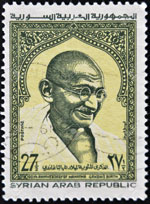
"Looking at the surface there is but a thin dividing line between mob-law and the people’s law. And yet the division is complete and will persist for all time. India is today quickly passing through the mob-law stage. The use of the adverb signifies my hope. It may be our misfortune to have to pass through that process even in slow stages. But it is wisdom to adopt every means at our disposal to have done with that stage as quickly as possible. …
For the present I conclude this somewhat lengthy article by suggesting some rules for guidance and immediate execution [regarding political demonstrations and receptions].
- There should be no raw volunteers accepted for big demonstrations. Therefore none but the most experienced should be at the head.
- Volunteers should have a general instructions book on their persons.
- At the time of demonstrations there must be a review of volunteers at which special instructions should be given.
- There should be no chain formed. It is humiliating.
- National cries [slogans] must be fixed and must be raised not anyhow, at any time or all the time … It is the training that a nation receives which characterizes the nature of its demonstrations. A Mohammedan silently worshipping in his mosque is no less demonstrative than a Hindu temple-goer making a noise either through his voice or his gong or both.
- If there are women in the crowd they should be specially protected.
- At meetings volunteers should be dispersed among the crowd. They should learn flag and whistle signalling in order to pass instructions from one to another when it is impossible for the voice to carry. …
This list does not pretend to be exhaustive. It is merely illustrative and designed to stimulate thought and discussion. I hope that all the vernacular papers will translate this article."
‘Dangers of Democracy’, Young India, 7-5-1931 [CWMG: 46 : 106]
Throwing sewage and money in Ganga
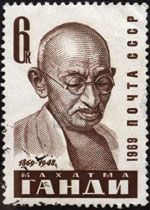
"Proceeding, Mahatma Gandhi said that he was shocked to hear that like Hardwar, the sacred rivers of Prayag were also allowed to be polluted by sewage water of the Municipality. This news caused much pain to Mahatma Gandhi. The Board thereby not only polluted sacred rivers but also threw in the river thousands of rupees, for otherwise sewage water could be beneficially utilized. He expressed his surprise at the Board being unable to do anything in that respect."
Letter to Sir Samuel Hoare, March 11, 1932 [CWMG 49: 192]
Keeping a good diary is an art
"For the present, it will be enough if all the people start using a small notebook like the one I use. Keeping a good diary is an art, and it can be of much benefit to the person keeping it and to the Ashram. One can record one’s work for the day in the fewest possible words and give a brief description of the things done."
Letter to Ramniklal Modi, Wardha, December 8, 1929: [CWMG 42: 252]
Addicted to reading
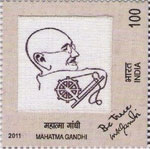
"The people are at present in an angry mood and boiling over, and therefore, pleased with nothing. They are labouring under a mistaken feeling of helplessness, that they are powerless to do anything which may end their suffering. And so they cling to anything that can make them forget their grief for a while, to anything which may provide them with an intoxicant in place of that of anger. That is why we see nowadays an excess of sensational writing in newspapers. Then, again, the craze for reading has increased and with that has grown the habit of reading long articles. All these are signs of a state of intoxication. Some people in Europe are so addicted to reading something or other that they cannot bear being without a book even for a while. It being impossible to go on reading instructive literature the whole day, the plague of “shilling shockers” is on the increase. A “shilling shocker” is a hair-raising novel, costing 8 annas. Novels written in restrained language cannot be thrilling. So writers and publishers, whose sole object is to make money, tempt readers with impossible stories written in language which no decent man can stand. Reading “shilling shockers” has thus become a disease which has affected hundreds of thousands of men and women. Even we in India are now in danger of catching this disease."
Discussion at Constructive Works Committee Meeting, New Delhi, December 11/12, 1947 [CWMG 90: 217]
To improve health, avoid newspapers
"Since I had no letter from you recently, I was beginning to be afraid lest you had fallen sick. You must regularly take sun-bath and apply mud-packs. Take complete rest and repeat Ramanama with eyes closed till you fall asleep. Give up all anxiety regarding your sons or other things. Don’t start taking milk yet. Take whey, as much hot water as you can and some honey. Among fruits, avoid heavy ones like bananas. You can take mosambi, orange or lemon; also raw vegetables. Stop all walking and reading. Get someone to read to you. Strictly avoid newspapers, because they publish all sorts of true and false reports about the country and about me, which make you anxious. Listen to newspaper reports only if you are a sthitaprajna. Listen to Ramayana, Bhagawat, the Bible, etc. If you carry out these instructions, you will recover soon and be in a position to share my work."
Fragment of a letter, November 23, 1947 [CWMG 90: 90]
Way out of darkness
"India, by finding true independence and self-expression through Hindu-Muslim unity and through non-violent means, i.e., unadulterated self-sacrifice, can point a way out of the prevailing darkness."
Young India, 6-10-1920, p. 4
Modern journalism
"The superficiality, the one-sidedness, the inaccuracy and, often, even dishonesty that have crept into modern journalism, continuously mislead honest men who want to see nothing but justice done."
Young India, 12-5-1920, p. 4
Nationalism and religion
"SA friend asked me the other day whether I shared the opinion often expressed that as between nationalism and religion, the former was superior to the latter. I said that the two were dissimilars and that there could be no comparison between dissimilars. Each was equal to the other in its own place. No man who values his religion as also his nationalism can barter away the one for the other. Both are equally dear to him. He renders unto Caesar that which is Caesar’s and unto God that which is God’s. And if Caesar, forgetting his limits, oversteps them, a man of God does not transfer his loyalty to another Caesar, but knows how to deal with the usurpation. A rehearsal of this difficulty gave rise to satyagraha.
Take a homely illustration. Suppose I have mother, wife and daughter. All the three must be equally dear to me in their own places. It is a vulgar error to think that a man is entitled to forsake his mother and his daughter for the sake of his wife. He dare not do the converse. And if any of the three oversteps her limits, the law of satyagraha comes to his assistance for the restoration of the equilibrium of the three forces."
New Delhi, November 28, 1947, Reported in Harijan, 7-12-1947 [CWMG, 90: 119]
India of my dreams
"I believe that nothing remains static. Human nature either goes up or goes down. Let us hope in India, it is going up. Otherwise, there is nothing but deluge for India and, probably, for the whole world....
Will a free India present to the world a lesson of peace, or of hatred and violence, of which the world is already sick unto death?"
Young India, 6-10-1920, p. 4
A new India
"I am only hoping and praying.... [that there] will rise a new and robust India, not warlike, basely imitating the West in all its hideousness, but a new India learning the best that the West has to give and becoming the hope, not only of
Asia and Africa, but the whole of the aching world. I must confess that this is hoping against hope, for we are today swearing by the military and all that naked physical force implies..... In spite, however, of the madness and the vain imitation of the tinsel of the West, the hope lingers in me and many others that India shall survive this death dance and occupy the moral height that should belong to her after the training, however imperfect, in non-violence for an unbroken period of thirty-two years since 1915."
Harijan, 7-12-1947, p. 453
Essence of democracy
"The spirit of democracy is not a mechanical thing to be adjusted by abolition of forms. It requires change of the heart..... [It] requires the inculcation of the spirit of brotherhood.... "
Young India, 8-12-1920, p. 3
‘Paradise on Earth’
"I remember to have read, I forgot whether in the Delhi or the Agra Fort, when I visited them in 1896, a verse on one of the gates, which when translated, reads: ‘If there is paradise on earth, it is here, it is here, it is here.’ That Fort, with all its magnificence at its best, was no paradise in my estimation. But I should love to see that verse with justice inscribed on the gates of Pakistan at all the entrances. In such paradise, whether it is in the Union or in Pakistan, there will be neither paupers not beggars, nor high nor low, neither millionaire employers nor half-starved employees, nor intoxicating drinks nor drugs. There will be the same respect for women as vouchsafed to men, and the chastity and purity of men and women will be jealously guarded, where every woman, except one’s wife, will be treated by men of all religions, as mother, sister or daughter according to her age, where there will be no untouchability and where there will be equal respect for all faiths. They will be all proudly, joyously and voluntarily bread labourers."
Harijan, 18-1-1948, p.526
My mission
"I am not a visionary. I claim to be a practical idealist. The religion of non-violence is not meant merely for the rishis and saints. It is meant for the common people as well. Non-violence is the law of our species as violence is the law of the brute. The spirit lies dormant in the brute and he knows no law but that of physical might. The dignity of man requires obedience to a higher law - to the strength of the spirit."
Young India, 11-8-1920, p. 3
Fearlessness
"Fearlessness is a sine qua non for the growth of the other noble qualities. How can one seek truth or cherish Love without fearlessness? As Pritam has it, ‘The Path of Hari (the Lord) is the path of the brave, not of cowards.’ Hari here means Truth, and the brave are those armed with fearlessness, not with the sword, the rifle or other carnal weapons, which are affected only by cowards."
Young India, 6-10-1920, p. 4
On journalism
"The superficiality, the one-sidedness, the inaccuracy and, often, even dishonesty that have crept into modern journalism, continuously mislead honest men who want to see nothing but justice done."
Young India, 12-5-1920, p. 4
Happiness
"Happiness...means an enlightened realization of human dignity and a craving for human liberty which prizes itself above mere selfish satisfaction of personal comforts and material wants and would readily and joy fully sacrifice these for self-preservation."
Young India, 5-3-1931, p. 1
Religion and politics
"Human life being a n undivided whole, no line can ever be drawn between its different compartments, not between ethics and politics. A trader who earns his wealth by deception only succeeds in deceiving himself when he thinks that his sins can be washed away by spending some amount of his ill-gotten gains on the so-called religious purposes. One’s everyday life is never capable of being separated from one’s spiritual being. Both act and react upon one another."
Harijan, 30-3-1947, p. 85
What Swaraj means to me
"By Swaraj I mean the government of India by the consent of the people as ascertained by the largest number of the adult population, male or female, native-born or domiciled, who have contributed by manual labour to the service of the State and who have taken the trouble of having their names registered as voters. Real Swaraj will come, not by the acquisition of authority by a few, but by the acquisition of the capacity by all to resist authority when it is abused. In other words, Swaraj is to be attained by educating the masses to a sense of their capacity to regulate and control authority. "
Young India, 29-1-1925, p. 41
The message of charkha
"The message of the spinning-wheel is much wider than its circumference. Its message is one of simplicity, service of mankind, living so as not to hurt others, creating an indissoluble bond between the rich and the poor, capital and labour, the prince and the peasant. That larger message is naturally for all."
Young India, 17-9-1925, p. 321
Simple living
"That everyone in this world should be able to maintain as high a standard of life as possible with the best possible output of labour is just as fantastic as to expect a camel to pass through the eye of a needle.... Luxurious living...is an impossible proposition for any society as a whole. And when there is no limit to luxury, where shall we stop? All the scriptures of the world have taught the exact opposite. ‘Plain living and high thinking’ is the ideal that has been placed before us. The vast majority recognizes its truth, but are unable to get there because of human frailty.
It is, however, perfectly possible to envisage such an existence.... Man falls from the pursuit of the ideal of the plain living and high thinking the moment we want to multiply his daily wants. History gives ample proof of this."
Harijan, 1-2-1942, p. 27
